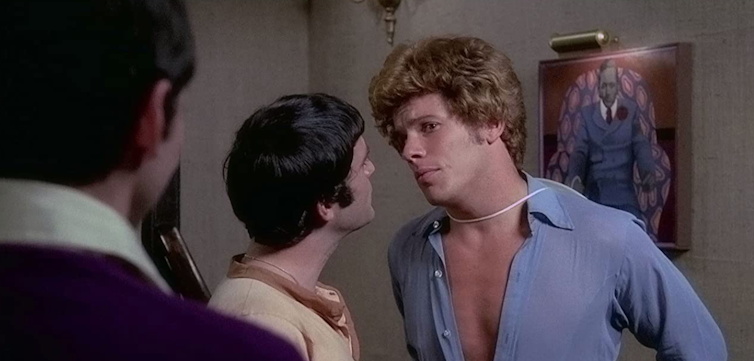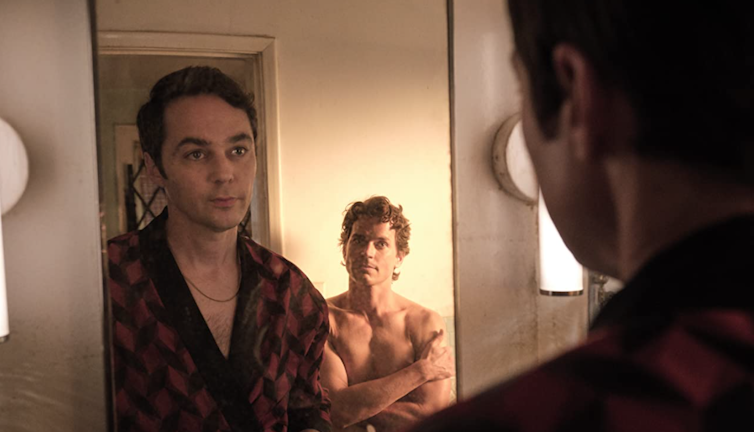The Boys in the Band: once banned in Australia, this pre-gay liberation story is now a fond, funny Netflix remake
- Written by Scott McKinnon, Research associate, University of Wollongong
The Boys in the Band, a remake of a 1970 film based on a 1968 play, has arrived on Netflix with little fanfare.
The film tells the story of Michael, a Hermés scarf-loving, Manhattan-dwelling gay man who is hosting a birthday party for a friend. Intended as a small event for seven gay men, a straight former college buddy of Michael’s also arrives unexpectedly. The party, to put it mildly, does not go well.
The guest of honour is Harold, a former figure skater who, in his spectacular party entrance, describes himself as “a 32-year-old, ugly, pockmarked, Jew, fairy.” That description sums up much of the film’s mood.
First performed a year before the New York Stonewall Riots, when LGBT people fought against police brutality, igniting a revolution, this is a pre-gay liberation story in which homosexual men swap barbed insults, indulge in a cruel party game and seem to be drowning in a sea of self-loathing.
The original play, written by Mart Crowley, was regarded as a breakthrough in the telling of gay stories. It was revived on Broadway in 2018 and the cast of that production star in the Netflix film.
Read more: With Moonlight's Oscar win, Hollywood begins to right old wrongs
But the 1970 film was initially banned in Australia, judged “indecent and obscene” by the Film Classification Board. It wasn’t until 1972, with the introduction of the “R” rating system that Australians could watch the movie.
The differing responses to versions of Crowley’s drama, 50 years apart, offer an intriguing case study in how historical context alters the way we understand a story.
Outdated and harmful?
In 1970, a film almost entirely about homosexual people was rare. As a result, The Boys in the Band was unlikely to be assessed purely on its merits as cinematic art or entertainment. Instead, it was read by censors as a threat to Australia’s inviolable heterosexuality.
When it finally screened here, in 1972, the gay liberation movement had burst into life and the response to the film from gay activists was wary.
Watching the party goers decry each other as “faggots,” (one character declares, “Show me a happy homosexual and I’ll show you a gay corpse”), Australian gay activists deemed the film outdated, harmful and cruel.
It was seen as a memory of a time happily left in the past, before gay liberation arrived with its messages of pride and freedom beyond the closet. But if this story was labelled a tired, outdated memory almost 50 years ago, what can a remake offer today?
Read more: Why are we still scared of seeing two men kissing?
A memory of a memory
As it turns out, plenty. Freed of much of the burden of representation it carried in 1970, The Boys in the Band now arrives as a funny, tense and heartbreaking memory of a memory.
The film is a fond, nostalgic replica of its predecessor. Some scenes are almost shot-for-shot copies. Others act more like the workings of memory, in that they evoke a sense of the earlier film without quite managing to create a direct duplicate.
 Cliff Gorman, Robert La Tourneaux, and Kenneth Nelson in the 1970 version of The Boys in the Band.
Cinema Centre Films, Leo Films
Cliff Gorman, Robert La Tourneaux, and Kenneth Nelson in the 1970 version of The Boys in the Band.
Cinema Centre Films, Leo Films
The performances similarly call to mind the original cast. At times, they sand the edges of some of the harsher earlier stereotypes, particularly Robin de Jesus, whose portrayal of the proudly “nelly” (or effeminate) Emory feels more real than the original one did.
Others add some new complexity or depth, including Andrew Rannells as Larry, who must negotiate his desire for free love with a partner looking for monogamous romance.
This distancing through layers of memory switches the central question of the story from “Is this who we are?” to “Is this who we used to be?”. Which isn’t to say present-day gay men won’t see something of themselves in the film.
The jokes, the relationships and the inner workings of gay friendship circles at times still ring true. But the stakes are lowered by the passing of time and the nostalgic haze.
Gay artists in the Hollywood mainstream
With an openly gay cast (many of them TV stars), a gay director and gay producers, the new film shows how gay artists, no longer on the fringes but working within mainstream Hollywood, have reclaimed and repositioned this story.
 Matt Bomer and Jim Parsons in the 2020 remake of The Boys in the Band.
Netflix
Matt Bomer and Jim Parsons in the 2020 remake of The Boys in the Band.
Netflix
In so doing, they reveal an element of gay culture that simply didn’t exist in 1970. Gay men’s mainstream cultural memory as displayed in the original film revolves around the popular divas of the day (Judy Garland, Bette Davis and Marlene Dietrich are all quoted or imitated by the cast).
Read more: Why Dorothy's red shoes deserve their status as gay icons, even in changing times
Today, that cultural memory also incorporates stories about gay people, written by gay people, including The Boys in the Band itself.
If the first film was Hollywood’s earliest attempt at revealing gay lives, the remake wraps its predecessor in layers of historical meaning.
Netflix’s film doesn’t carry the burden of being a landmark. Instead, it recalls the earlier film’s breakthrough as something worth remembering.
Authors: Scott McKinnon, Research associate, University of Wollongong





